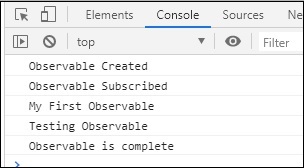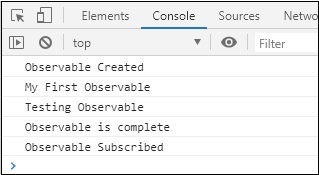
- RxJS - Home
- RxJS - Overview
- RxJS - Environment Setup
- RxJS - Latest Updates
- RxJS - Observables
- RxJS - Operators
- RxJS - Working with Subscription
- RxJS - Working with Subjects
- RxJS - Working with Scheduler
- RxJS - Working with RxJS & Angular
- RxJS - Working with RxJS & ReactJS
- RxJS Useful Resources
- RxJS - Quick Guide
- RxJS - Useful Resources
- RxJS - Discussion
RxJS - Working with Scheduler
A scheduler controls the execution of when the subscription has to start and notified.
To make use of scheduler we need the following −
import { Observable, asyncScheduler } from 'rxjs';
import { observeOn } from 'rxjs/operators';
Here is a working example, wherein, we will use the scheduler that will decide the execution.
Example
import { Observable, asyncScheduler } from 'rxjs';
import { observeOn } from 'rxjs/operators';
var observable = new Observable(function subscribe(subscriber) {
subscriber.next("My First Observable");
subscriber.next("Testing Observable");
subscriber.complete();
}).pipe(
observeOn(asyncScheduler)
);
console.log("Observable Created");
observable.subscribe(
x => console.log(x),
(e)=>console.log(e),
()=>console.log("Observable is complete")
);
console.log('Observable Subscribed');
Output

Without scheduler the output would have been as shown below −

Advertisements